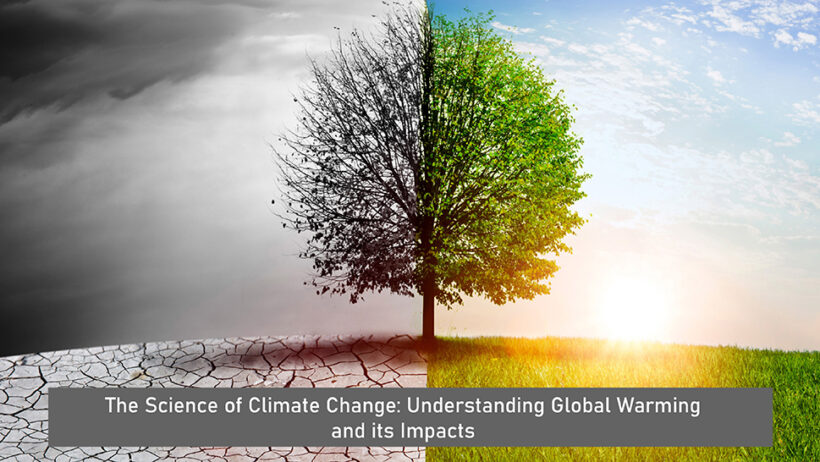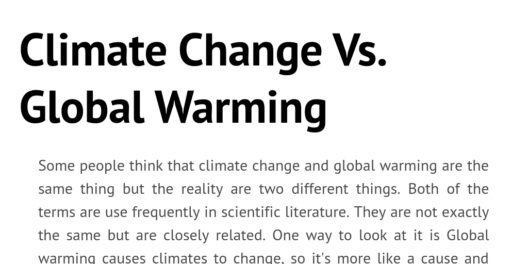The Crucial Nature of Global Warming
Global warming signifies a profound shift in the Earth’s climate system, primarily driven by anthropogenic activities that emit greenhouse gases. The escalation in average global temperatures is not merely a scientific calculation; it embodies a nexus of socio-economic implications, ecological destabilization, and an urgent call for introspection regarding humanity’s relationship with nature. Understanding why global warming is vital entails delving into its multifaceted repercussions that transcend geographical boundaries and generations.
The Rise of Temperature: An Omnipresent Crisis
Since the dawn of the industrial age, the planet’s average temperature has risen markedly. This warming trend is not a distant forecast but a present reality, evidenced by melting glaciers, rising sea levels, and increasingly severe weather patterns. For instance, many regions are now witnessing an uptick in catastrophic hurricanes, droughts, and heatwaves, leading to widespread devastation.
The impacts of climate change affect ecosystems at every level. Coral reefs face bleaching, terrestrial plants and animals undergo habitat shifts, and the extinction rate accelerates for numerous species unable to adapt to rapidly changing conditions. This cascade of consequences underlines an alarming reality: global warming is not an isolated phenomenon but a precursor to ecological collapse.
The Societal Ramifications: Who Bears the Burden?
While environmental degradation is an undeniable outcome of global warming, the societal implications must not be overlooked. Vulnerable communities often suffer the most devastating impacts. Rising sea levels threaten coastal populations, and agricultural struggles undermine food security, particularly in developing nations. The burden of climate-induced migrations has become a pressing concern, leading to the term “climate refugees.”
This phenomenon elucidates deeper inequalities. Wealthier nations, having contributed disproportionately to carbon emissions, bear a moral responsibility to aid those suffering the consequences. The urgency of tackling climate change becomes evident as we acknowledge that it poses existential threats, particularly to marginalized communities.
Economic Implications: A Cost Benefit Analysis
The economic ramifications of ignoring global warming cannot be underestimated. The financial toll of natural disasters is escalating, straining government budgets and insurance companies. It is estimated that climate change could cost the global economy trillions of dollars over the coming decades. Yet, investing in sustainable practices, renewable energy, and green technologies can mitigate these costs while fostering economic growth.
Transitioning toward a green economy is not simply a prudent decision; it is a logical necessity. Shifting from fossil fuels to renewable energy systems reduces dependence on finite resources while stimulating job creation in emerging sectors. By embracing innovative technologies, societies can not only confront the climate crisis but also promote economic resilience.
Policy and Global Cooperation: A Unified Response
Addressing global warming necessitates a coordinated policy response. International accords like the Paris Agreement signify a collective recognition of the climate crisis and the need for collaborative action. Yet the efficacy of such agreements hinges on the commitment of individual nations to enact and enforce meaningful legislation.
Policies must encompass broad strategies to involve various sectors, including transportation, energy, and agriculture. Initiatives that promote carbon pricing, subsidize renewable energy, and enhance public transportation are imperative. These measures encourage a cultural shift towards sustainable practices, which is critical in reversing detrimental trends.
Public Awareness and Engagement: The Role of Advocacy
Public engagement is an indispensable element in the fight against climate change. Raising awareness on the significance of global warming fosters a culture of accountability. When individuals understand the stakes involved, they are more likely to advocate for sustainable practices in their own lives and demand action from policymakers.
Grassroots movements have emerged globally, urging leaders to act decisively. The role of environmental activism is to galvanize public sentiment and ensure that climate change remains at the forefront of political agendas. Community initiatives focusing on local sustainability projects can foster a sense of ownership and responsibility towards environmental stewardship.
The Imperative of Education: Building a Sustainable Future
Education serves as the bedrock of twenty-first-century environmental activism. Integrating climate education into school curricula can empower younger generations with the knowledge and tools necessary to combat climate change effectively. By understanding the signs and impacts of global warming, students can become proactive participants in this critical dialogue.
Moreover, promoting scientific literacy related to climate science can dispel misinformation and foster evidence-based discourse around environmental challenges. When communities are educated on the interdependence of ecological systems and human livelihoods, there is a greater chance for concerted action.
Conclusion: Embracing Responsibility for Future Generations
The urgency of tackling climate change is not a matter of preference but a necessity for survival. Global warming harbors consequences that ripple through our ecosystems, economies, and societies. We stand at a pivotal moment; the choices made today will shape the trajectory of life on Earth for generations to come. The complexities surrounding this issue should compel us to act with immediacy and conviction. Ultimately, our response to global warming must be marked by collective intention and unwavering determination.







